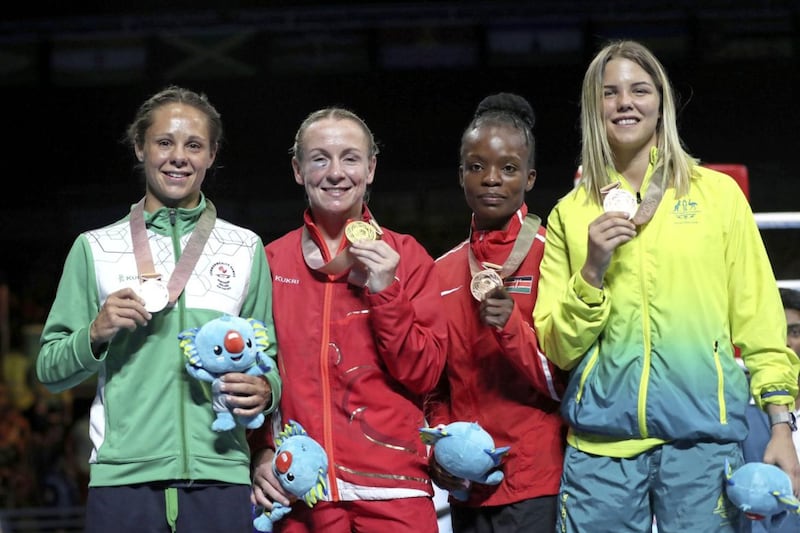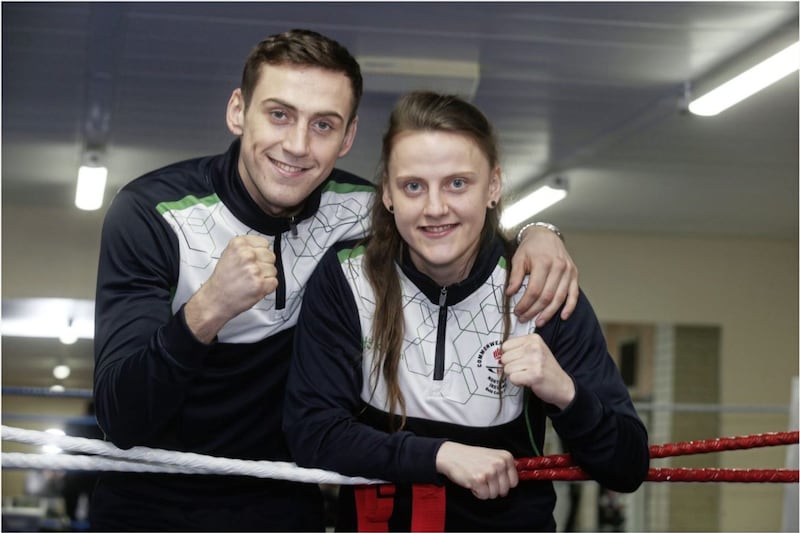ONE Olympic Games, two World Elite Championships, one European Championships, a European Games, three Irish Elite titles at two different weights and two Ulsters.
Brendan Irvine doesn’t turn 22 until next month. By then he will have added the Commonwealth Games to an already incredible roll call of domestic and international achievement since his first fight as a senior in January 2015.
And, if you fancied a flutter with the bookies, the smart money would be on the west Belfast flyweight - who begins his campaign against Jabali Breedy (Barbados) on Monday morning - returning from Australia with another medal around his neck.
Sometimes it is easy to forget that Irvine is still so young because, for anybody involved in boxing, his talent has been common knowledge for the guts of a decade, the burden of expectation growing with each title accrued along the way.
“I won the seniors at 18 and people thought that might have been a bit early, but boxing’s been my life for as long as I can remember,” says the man known as ‘Wee Rooster’.
“Winning that first Irish senior title was the big one for me. I beat Hughie Myers in the final, he had fought Paddy [Barnes], and when you’re in there with him, it’s like he’s made of rock.
“But that showed the level I was competing at and set me up for the year…”
Five months later Irvine had moved on to a different level altogether, producing some stirring performances en route to taking light-fly silver at the inaugural European Games.
“I didn’t realise until a couple of years later how big that actually was,” admits Irvine.
In three of those fights he lost the first round, only to battle back and get the nod from the judges. Even the final only went against him on a split, and all of a sudden people were hailing the heir apparent to 49kg king Barnes.
Irvine was still growing into his 5”7 frame, however, and making weight was becoming more and more of an issue.
He decided towards the end of 2015 to make the step up to 52kg in a bid to reach the Rio Olympics – a huge ask, especially considering the limited time left to build into the weight.
But Irvine was still riding the crest of a wave and called on everything he had to edge an Olympic qualifier box-off with Bulgaria's Daniel Asenov in Turkey the following spring.
For a man who had long dreamt of making it to the Olympics Games, the Brazil-bound teenager was now approaching fairytale territory.
Reality had to bite some time, however, and it bit hard on a summer Saturday inside the Riocentro Pavilion.
After being given a bye in the last 32, Irvine was paired against little-known Uzbek Shakhobidin Zoirov. With some bigger names elsewhere in the draw, the Irish team were quietly optimistic.
Zoirov, though, turned out to be a bit special, seeing off Irvine before coasting beyond the rest of the field to take 52kg gold.
In the World Series of Boxing at the end of February he fought the brilliant Cuban Robeisy Ramirez, a gold medallist at both the 2012 and 2016 Olympics, beating Michael Conlan in the London semi-final.
Zoirov handed him a boxing lesson, taking four of the five rounds on all the judges’ scorecards.
“He’s unbelievable,” says Irvine.
“It’s only really now people are realising how much I was thrown in at the deep end. Obviously he had done some work on me and knew I started slow… I started getting back into it a bit, but he was just phenomenal.
“I’ve never watched the fight back; it sickened me to be honest. Obviously getting to the Olympic Games is amazing, but you want to do well when you get out there. What can you do?
“People say ‘how did you get on?’ You don’t like saying ‘aye, well, I was beat by the champion’. You know, I was beat in my first fight. It’s sickening.
“But you have to learn from that and keep it in perspective too. I’ve done a lot pretty early in my career, and fighting at the Olympic Games is something that will stand by me for the rest of my life.”
Less than a year after returning from Rio, Irvine landed European bronze and has steadily built towards the Gold Coast. Despite never having been there, Australia holds a special place in his heart.
Irvine’s mum Brenda was born in Melbourne and he still has relatives in the city, while best friend Niall Mulholland and his family swapped Glencolin for Adelaide 11 years ago.
The pair have remained in constant contact, and Mulholland will be at Oxenford Studios to cheer Irvine on.
“I was actually talking to him last night,” he smiles.
“He moved out there when he was 10 and he’s doing really well for himself out there, so it’s good that he’s coming up to see me.”
With the likes of Paddy Barnes and Michael Conlan - gold medallists in Glasgow four years ago - off the scene, medal hopes fall on the shoulders of the men and women with the most experience on the international stage.
Steven Donnelly, Michaela Walsh, Sean McComb, Kurt Walker and, unquestionably, Brendan Irvine.
“People have been saying that alright.
“After the Commonwealths I’ll have been to every major tournament. There’s not many have done that, so it comes with the territory to an extent.
“There’s expectation because boxing has been bringing medals home from the Commonwealths for years, so there’s that expectation on us all. The way I look at it is, would you rather have the pressure of people expecting you to win a medal, or having no pressure and people thinking you’re going out to make up the numbers?
“You have to thrive on that pressure and embrace it.”

DANGER IN THE DRAW
52kg: Reece McFadden (Scotland)
THE absence of the tall, rangy Niall Farrell from the England team could be huge. Farrell edged past Brendan Irvine in last year’s European semi-final but, with the Birmingham teenager out, England haven’t selected a fighter at 52kg. McFadden, meanwhile, took bronze in Glasgow four years ago, stunning gold medal favourite Andrew Selby along the way








